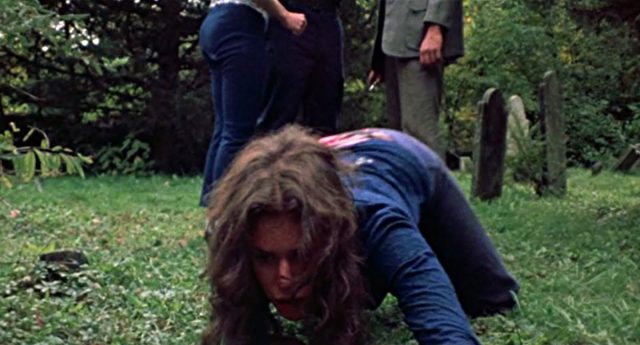Monday Movie: The Last House on the Left, by David Bax

Okay, hear me out, I swear this will be about movies. I love to put hot sauce on my food. My spice tolerance is probably a little higher than the average person’s. But I do this because it tastes better to me, not as some personal challenge. In fact, I’ve always been a little annoyed by people whose only criterion for a hot sauce is its Scoville rating, the kind of people who buy those bottles with vulgar drawings advertising the unspeakable things the contents will do to your digestive system. Food ought to be both nourishing and tasty, not a trial (for what it’s worth, I also enjoy a drink but have never once participated in any sort of drinking game). I think of those people and those bottles when I think of movies like Wes Craven’s The Last House on the Left. It’s a truly upsetting and disturbing movie and the talent and skill required to make something so undeniably powerful in those respects is not lost on me. But forcing myself to sit through it feels like eating a ghost pepper. It didn’t kill me, I guess, but was it worth it?
Five years later, Craven would follow up this debut film with the much more accomplished The Hills Have Eyes. The two films are stylistically similar, if not geographically so. In The Last House on the Left, two teenage girls are tortured, raped and murdered by a band of lunatics in the Connecticut exurbs, as opposed to the family tortured, raped and murdered by a band of lunatics in the Southwestern desert in The Hills Have Eyes. In both cases—but especially in the former—Craven’s intrusive, vérité style of close-ups and long takes makes the violence visceral and terrifying. Even the amateurish performances add a certain unvarnished verisimilitude.
This all makes The Last House on the Left a tough sit but it’s not what makes it a bad film. What tilts the movie toward empty callousness is the broad comic relief to which Craven keeps returning in between bouts of brutality. The plucky, twangy guitar music; the bumbling sheriff and his deputy; the frothy, goofy montage of parents baking a cake for the daughter they are unaware is currently being raped. These touches, which appear cheap, cynical and mean-spirited alongside the movie’s savagery, derail any artistic or moralistic arguments in favor of depicting violence unflinchingly. Craven went on to greatness and his talents here are already obvious. But it still feels like anyone who goes around praising this movie is just kinda showing off.





























Boy, I wish I could find the reference today. I think it’s from a Fresh Air interview, a full one, not the restrospective clips one aired after Wes Craven passed. I’m pretty sure it’s the only interview I’ve heard with him, so I’ll say it was Terry Gross who asked him about Last House, and he eventually talked about the humor, those cops particularly, and said that was just inept film making. Either it was that he’d thought he should provide relief from the darkness, in a sort of auto-pilot way, or he thought he was just a bad writer at the time, but that aspect, the humor in the film, is what he would cut, if anything, and not for moral reasons – he just dropped the ball with those scenes, didn’t know what he was doing.
Otherwise, and you’ll find this in any interview he gives about it, the point of the brutality was that in films at the time, violence had become fun. It was balletic, or cool, not real, like what was going on in Viet Nam, for instance, and he wanted people to reappraise what it really meant to treat human beings this way. Hearing that interested me in seeing this picture, sort of again. A friend and I tried it on videotape, terrible looking stuff, and we just turned it off. We found it laughable, both the humor scenes you cite (though we read them the way Craven seems to’ve late in life) and we just weren’t tolerant of its rawness, which we saw as cheapness. I was surprised to be interested in checking it out after those interviews, and after seeing The Virgin Spring, and realizing just how directly Last House is a remake of that Bergman film, cold brutality (if less graphic) included.